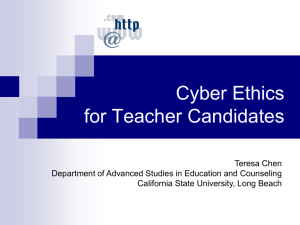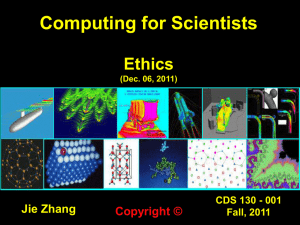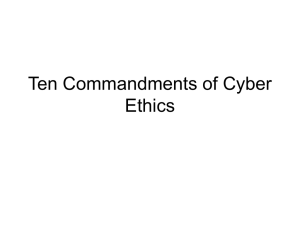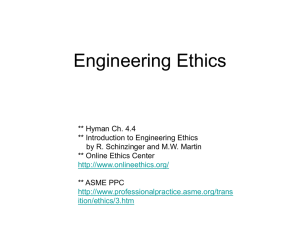Powerpoint Notes on Ethics
advertisement
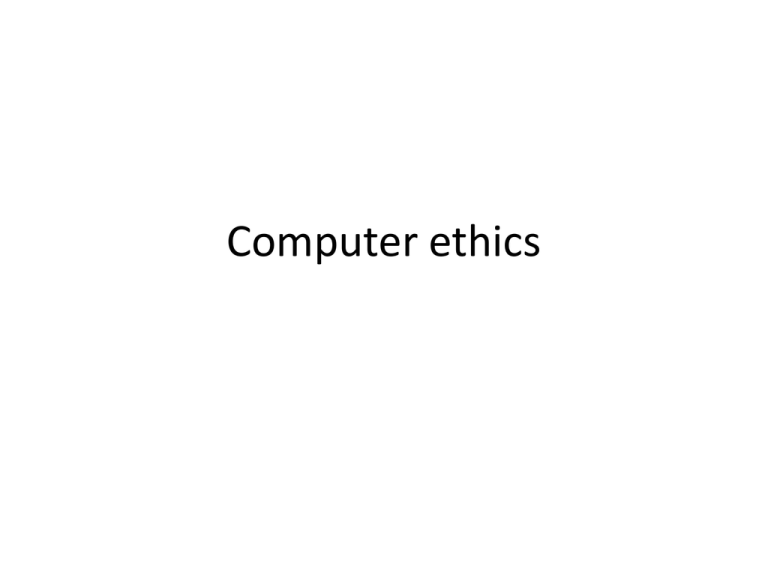
Computer ethics eth·ics [eth-iks] plural noun 1 ( used with a singular or plural verb ) a system of moral principles: the ethics of a culture. 2 the rules of conduct recognized in respect to a particular class of human actions or a particular group, culture, etc.: medical ethics; Christian ethics. 3 moral principles, as of an individual: His ethics forbade betrayal of a confidence. 4. (usually used with a singular verb ) that branch of philosophy dealing with values relating to human conduct, with respect to the rightness and wrongness of certain actions and to the goodness and badness of the motives and ends of such actions. http://dictionary.reference.com/browse/ethics mor·al [mawr-uhl, mor-] Adjective 1. of, pertaining to, or concerned with the principles or rules of right conduct or the distinction between right and wrong; ethical: moral attitudes. 2. expressing or conveying truths or counsel as to right conduct, as a speaker or a literary work; moralizing: a moral novel. 3. founded on the fundamental principles of right conduct rather than on legalities, enactment, or custom: moral obligations. 4. capable of conforming to the rules of right conduct: a moral being. 5. conforming to the rules of right conduct ( opposed to immoral): a moral man. http://dictionary.reference.com/browse/morals Computer ethics Computer Ethics is a branch of practical philosophy which deals with how computing professionals should make decisions regarding professional and social conduct. 1 2 3 Internet Privacy 4 Internet Control 5 Computer Reliability 6 7 8 Ethical standards 9 10 11 12 http://en.wikipedia.org/wiki/Computer_ethics There are a number of computers based ethical dilemma that are frequently discussed. One set of issues deals with some of the new ethical dilemma that have emerged, or taken on new form, with the rise of the Internet and Social Networking. There are now many ways to gain information about others that were not available, or easily available, before the rise of computers. Thus ethical issues about storage of personal information are now becoming an ever increasing problem. With more storage of personal data for social networking arises the problem of selling that information for monetary gain. This gives rise to different ethical situations regarding access, security, and the use of hacking in positive and negative situations. Situations regarding the copyright infringement of software , music, movies, are widely becoming discussed, with the rise of file sharing programs such as Napster , Kazaa , and the BitTorrent (protocol) . The ethical questions that arise from software piracy are : is it immoral or wrong to copy software, music, or movies? The use of Internet as a tool for abuse; spreading child porn, harassment of others, and other challenges as a result of kids use of this media for both consumption and producing. A second set of questions pertaining to the Internet and the societal influence that are becoming more widely discussed are questions relating to the values that some may wish to promote via the Internet. Some have claimed that the Internet is a "democratic technology”. Does the Internet foster democracy and freedom of speech? What are the ethical implications of this process on the world? Does the digital divide raise ethical issues that society is morally obligated to change and spread the ability to access different forms of electronic communication? Ethical standards Various national and international professional societies and organizations have produced code of ethics documents to give basic behavioral guidelines to computing professionals and users. They include: Association for Computing Machinery: ACM Code of Ethics and Professional Conduct British Computer Society:BCS Code of Conduct & Code of Good Practice IEEE: IEEE Code of Ethics Ten Commandments of Computer Ethics. Created by the Computer Ethics Institute 1. Thou Shalt Not Use A Computer To Harm Other People. 2. Thou Shalt Not Interfere With Other People’s Computer Work. 3. Thou Shalt Not Snoop Around In Other People’s Computer Files. 4. Thou Shalt Not Use A Computer To Steal. 5. Thou Shalt Not Use A Computer To Bear False Witness. 6. Thou Shalt Not Copy Or Use Proprietary Software For Which You have Not Paid. 7. Thou Shalt Not Use Other People’s Computer Resources Without Authorization Or Proper Compensation. 8. Thou Shalt Not Appropriate Other People’s Intellectual Output. 9. Thou Shalt Think About The Social Consequences Of The Program You Are Writing Or The System You Are Designing. 10. Thou Shalt Always Use A Computer In Ways That Insure Consideration And Respect For Your Fellow Humans. http://computerethicsinstitute.org/publications/tencommandments.html 50 Facts that should change the world Jessica Williams (2007) Icon Books, Cambridge The last Comanche Chief: The Life and Times of Quanah Parker. Bill Neeley (1995) John Wiley & Sons, Inc.
